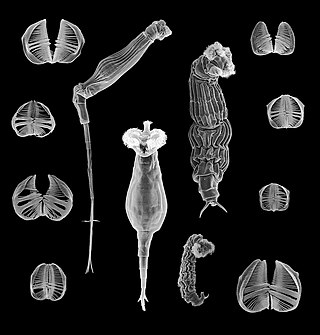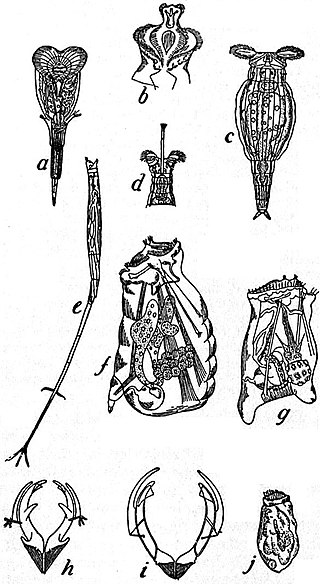Cephalodella is a genus of rotifers in the family Notommatidae, with 190 species worldwide. [3]
Contents
Cephalodella vittata is a species endemic to Lake Baikal. [4]
Cephalodella is a genus of rotifers in the family Notommatidae, with 190 species worldwide. [3]
Cephalodella vittata is a species endemic to Lake Baikal. [4]
Gnathostomulids, or jaw worms, are a small phylum of nearly microscopic marine animals. They inhabit sand and mud beneath shallow coastal waters and can survive in relatively anoxic environments. They were first recognised and described in 1956.

The rotifers, sometimes called wheel animals or wheel animalcules, make up a phylum of microscopic and near-microscopic pseudocoelomate animals.

Bdelloidea is a class of rotifers found in freshwater habitats all over the world. There are over 450 described species of bdelloid rotifers, distinguished from each other mainly on the basis of morphology. The main characteristics that distinguish bdelloids from related groups of rotifers are exclusively parthenogenetic reproduction and the ability to survive in dry, harsh environments by entering a state of desiccation-induced dormancy (anhydrobiosis) at any life stage. They are often referred to as "ancient asexuals" due to their unique asexual history that spans back to over 25 million years ago through fossil evidence. Bdelloid rotifers are microscopic organisms, typically between 150 and 700 μm in length. Most are slightly too small to be seen with the naked eye, but appear as tiny white dots through even a weak hand lens, especially in bright light. In June 2021, biologists reported the restoration of bdelloid rotifers after being frozen for 24,000 years in the Siberian permafrost.

Artemia is a genus of aquatic crustaceans also known as brine shrimp or sea monkeys. It is the only genus in the family Artemiidae. The first historical record of the existence of Artemia dates back to the first half of the 10th century AD from Lake Urmia, Iran, with an example called by an Iranian geographer an "aquatic dog", although the first unambiguous record is the report and drawings made by Schlösser in 1757 of animals from Lymington, England. Artemia populations are found worldwide, typically in inland saltwater lakes, but occasionally in oceans. Artemia are able to avoid cohabiting with most types of predators, such as fish, by their ability to live in waters of very high salinity.

River stingrays or freshwater stingrays are Neotropical freshwater fishes of the family Potamotrygonidae in the order Myliobatiformes, one of the four orders of batoids, cartilaginous fishes related to sharks. They are found in rivers in tropical and subtropical South America. A single marine genus, Styracura, of the tropical West Atlantic and East Pacific are also part of Potamotrygonidae. They are generally brownish, greyish or black, often with a mottled, speckled or spotted pattern, have disc widths ranging from 31 to 200 centimetres (1.0–6.6 ft) and venomous tail stingers. River stingrays feed on a wide range of smaller animals and the females give birth to live young. There are more than 35 species in five genera.

Brachionus is a genus of planktonic rotifers occurring in freshwater, alkaline and brackish water.

Neverita is a genus of medium-sized to large sea snails, marine gastropod molluscs in the subfamily Polinicinae of the family Naticidae, the moon snails

Brachionus plicatilis is a euryhaline rotifer in the family Brachionidae, and is possibly the only commercially important rotifer, being raised in the aquaculture industry as food for fish larvae. It has a broad distribution in salt lakes around the world and has become a model system for studies in ecology and evolution.

Gnathifera is a clade of generally small spiralians characterized by complex jaws made of chitin. It comprises the phyla Gnathostomulida, Rotifera and Micrognathozoa. Chaetognatha has recently been recognised as closely related to the group, with it either being included within Gnathifera or the broader group Chaetognathifera.

Mangelia unifasciata is a species of sea snail, a marine gastropod mollusk in the family Mangeliidae.

Brachionus calyciflorus is a planktonic rotifer species occurring in freshwater. It is commonly used as a model organism in toxicology, ecology and evolutionary biology.
Its advantages include the small size and short generation time.

Keratella cochlearis is a rotifer. The planktonic animal occurs worldwide in freshwater and marine habitats.

Notommatidae is a family of rotifers in the order Ploima.

Condylostoma is a genus of unicellular ciliate protists, belonging to the class Heterotrichea.
2015 in paleoentomology is a list of new fossil insect taxa that were described during the year 2016, as well as other significant discoveries and events related to paleoentomology that were scheduled to occur during the year.
Ascomorpha is a genus of rotifers belonging to the family Gastropodidae.
Gastropodidae is a family of rotifers belonging to the order Ploima.

Brachionidae is a family of rotifers belonging to the order Ploima. Species are found in freshwater and marine habitats.

Asplanchna brightwellii are a species of rotifer from the genus Asplanchna. They are known to inhabit eutrophic water. The sac-like freshwater rotifier is known to eat cladocerans, protozoans, and other rotifers. A. brightwelli are relatively large for rotifiers, transparent and ovoviviparous which makes the species ideal for morphological studies.